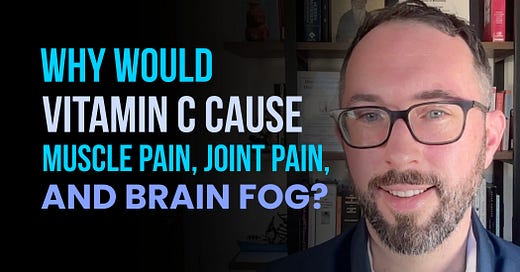Question: Why Would Vitamin C Cause Joint Pain, Muscle Pain, and Brain Fog?
Short Answer: Acutely, vitamin C would likely cause these effects by generating oxalate, which could cause crystals that lead to muscle and joint pain, and could cut energy metabolism in half, leading to brain fog. This vulnerability could result from deficiencies of any of the B vitamins, any of the electrolytes, or of iron, copper, or sulfur; from diabetes, low adrenals, or hypothyroidism; or from any of the hundreds of genetic defects in energy metabolism, only one of which is glucose 6-phosphate dehydrogenase deficiency; or any one of a huge number of toxins that impair energy metabolism. Chronically, vitamin C may increase the harms of iron overload or contribute to copper deficiency. The main ways to manage these latter issues are to take vitamin C away from meals, to maintain good copper status through proper dietary intake, and to treat iron overload with phlebotomy.
This episode was cut from the original Q&A session that you can find here.
DISCLAIMER: I have a PhD in Nutritional Sciences and my expertise is in performing and evaluating nutritional research. I am not a medical doctor and nothing herein is medical advice.
Listen to the Audio
I highly recommend watching the video above but you can also listen to the audio here:
Read the Transcript or Leave a Comment
Masterpass members have access to the transcript below.
Masterpass members can also read and leave comments below. Non-members can read and leave comments on the general podcast page.
Learn more about the Masterpass here.




